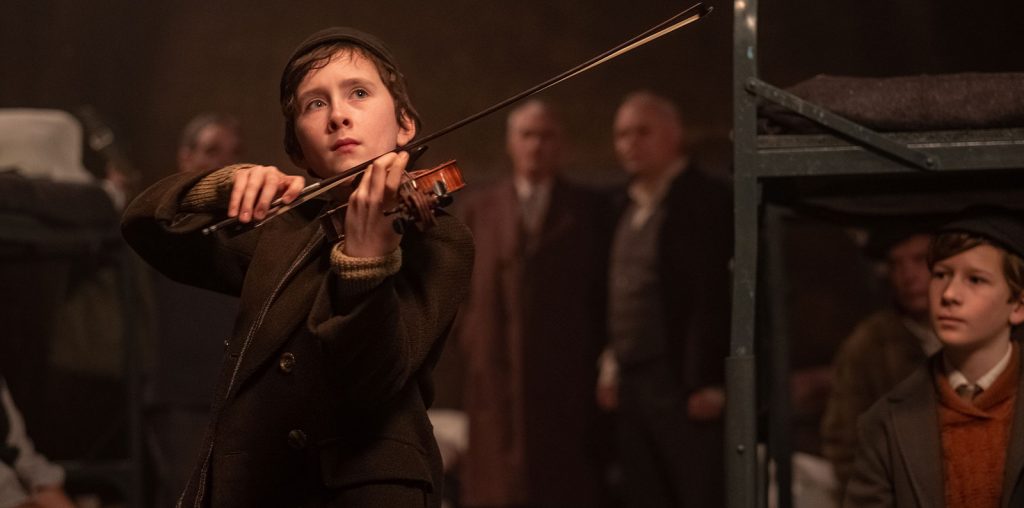
I really hate that phrase “In this current climate.” An almost certain indicator, I’m going to use it immediately. So, here we go. In this current climate, expressing one’s opinions and feelings can cost you your job, friends, family and invite attacks, especially when just the hint of challenging politically correct ideas is involved.
So, I was assigned How Jack Became Black, a controversial documentary addressing the problems of identity politics. So, here’s the warning. Eli Steele’s film is sure to trigger a lot of people, but he asks good questions and is worthy of a moment to pause and consider where he’s coming from. Personally, I like having my beliefs attacked and challenged. When challenged, my positions either changed or are strengthened. Both happen every day. So, you up for a challenge? Yes. With an open heart and an open mind, I present How Jack Became Black.
Filmmaker Eli Steele has a problem. His father is black, and his mother is Jewish. That’s not the problem. Eli fell in love and married his Mexican wife. That’s not the problem, either. They had two children Jack and June. That makes Jack and June African, Jewish, Hispanic-Americans. Here’s the problem. Jack is about to enter the first grade and the Los Angeles Unified School District, the State of California, and the U.S. Department of Education demands that Eli declares a “primary race” for Jack or he will not be able to complete enrollment to public school.
With one check of the box, Jack became black. Does Jack look black? Does it matter? Practically speaking, Jack will receive specific privileges, benefits, and walk down a specific academic path based solely on which box Eli selects. But the practical quickly turns into the philosophical as Eli considers the ramifications of a country obsessed with identity and impact is having on those who are mixed race.

“…the Los Angeles Unified School District…demands that Eli declares a ‘primary race’ for Jack or he will not be able to complete enrollment to public school.”
We live in a diverse culture. One out of every seven marriages in the U.S. is mixed race (including mine). Several of Steele’s subjects talk about their struggles with personal identity. While his subjects are proud to be part of two or more rich cultures, they experienced persecutions as their love for one culture was misinterpreted as a rejection of the other. Many wondered why they have to choose a “primary” race at all. Why can’t they just be identified as a human being, rather than be marginalized by their skin color? If Steele refused to select a race, then one of the office staff would simply look at Jack and choose a race based on Jack’s appearance. Do you find something wrong with that?
Steele then moves the conversation to race and character. “Does race trump character?” Steele’s phrasing here is intentional, which leads us to Martin Luther King, Jr.’s famous I Have a Dream Speech. Has King’s dream of judging a person by their character over skin color been stymied by politics. Steele would say yes. He delves into the cultural identity wars as it relates to the Trump election and presidency. He also widens the controversy by looking at Bill DeBlasio’s increasing poll numbers the moment his son began campaigning for him and then he goes to Compton asking why Republicans won’t go there. Yes, now the “fit has hit the shan.”
How Jack Became Black then doubles down and examines the Trayvon Martin murder/shooting. What we non-Floridians saw as a racially volatile moment in U.S. history was complicated by the fact that while shooter George Zimmerman’s father was white, his mother was Peruvian. Steele wonders if this case would have gained national attention if New York Times had truthfully identified Zimmerman as White-Hispanic instead of just White. Rather than this being a case of one person wrongfully killing another person, the story turned into a race war. Would the outcome be different? Would the blind scales of justice have prevailed?

“…his questions are meant to challenge a divided nation and challenge the current narrative of race relations. But can cooler heads prevail?”
Personally, I have the simple “luxury” of checking one box. Before any company, organization, or institution ever gets to know me as a person, the first thing they’ll know is I’m Asian, and I get to reinforce that with a simple checkmark. Don’t get me wrong, I’m incredibly proud of my Asian heritage, but there’s a lot more to me than where my grandparents came from.
One day, I was at our local 7-Eleven with my kid, and I asked her what college she wanted to attend. She said, “Harvard.” I laughed and told her to forget about Harvard. She would have to graduate first in her class and even then that wouldn’t be enough. I then explained that her white friends had a better chance of getting into Harvard, which elicited a response from her white friend, “That sounds racist.” I replied, “Yes, it does.”
I’m not bitter…much. But there’s just this feeling of injustice knowing when my kid checks “Asian/Pacific Islander” on her college application, she’s already doomed herself for failure. My only consolation is that the real reason she won’t get into Harvard is that her grades suck.
Like Bowling for Columbine or An Inconvenient Truth, if How Jack Became Black finds an audience, it will be a polarizing film. Unlike those film, it leans (if not, falls over) to the Right. I recommend this film not because I agree or disagree with Steele’s premise and conclusions, but because of his honesty, his guts to challenge politically-correct ideas, and the thought-provoking questions he asks. Bringing us back to “this current climate,” his questions are meant to challenge a divided nation and challenge the current narrative of race relations. But can cooler heads prevail? I still naively believe in the possibility of racial equality, but am I the only one? Is the end game still racial equality? Is there still an end game?

How Jack Became Black (2018) Written and directed by Eli Steele. Narrated by Justin Gordon.
8 out of 10 stars



It’s apparent that the writer is a data geek. I enjoy how he writes and
writes facts.
The premise of this documentary is simply not true. In California, as in other states, school children can check as many races as they want to. They do not have to specify a primary race–period. This has been in place since 1997 when Project RACE (Reclassify All Children Equally), worked with the federal government, the U.S. Census Bureau, and The Office of Management and Budget (OMB) to change the check only one mandate. Perhaps the boy in the movie goes to a private school. We also resent the comment that calling children “biracial” or “multiracial” drives them away from being black. All children should be able to embrace their entire heritage. Check out Project RACE at projectrace.com
Susan – you obviously didn’t watch the movie. It’s public school , not private. Yes, children attending public school are (or were at the time Jack was applying to school) forced to choose a “primary race”. You can check more than one box, but you still must check a “primary race” box
And that’s not the premise for the film. It’s just a jumping off point. Maybe first rent the movie. Then leave a comment.
Would Alan be interested to read the complete letter our son wrote to President Obama that is part of How Jack Became Black? Our son wrote the letter that was sent to President Obama as our son was heading to the war in Afghanistan in 2009.
Really enjoyed this review, Alan.